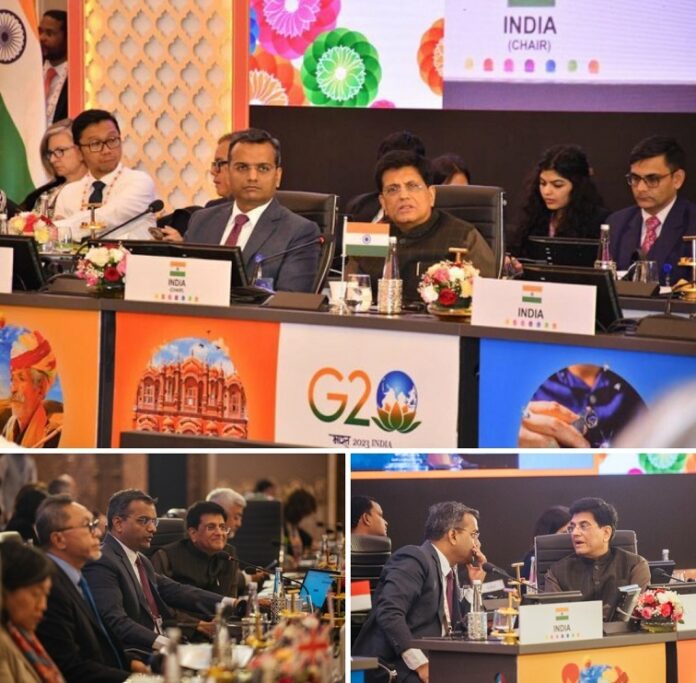
By Our Correspondent
JAIPUR/BHUBANESWAR: G20 Trade and Investment Ministerial Meeting in Jaipur: Outcome Document and Chair’s Summary.The Outcome Document comprises the entire text, which was unanimously agreed to by all G20 members, except for Paragraph 32 which pertains to the Chair’s Summary
Introduction
We, the G20 Ministers responsible for Trade and Investment, met in Jaipur on 24- 25 August 2023, under India‟s G20 Presidency‟s theme, “One Earth, One Family, One Future.” We remain in the middle of a multi-dimensional crisis that raises global challenges such as macroeconomic instability, food insecurity and disruptions across Global Value Chains (GVCs).
We agree that trade, along with domestic production, plays a vital role in improving global food security in all its dimensions. This crisis is undermining resilient, sustainable and inclusive economic growth and poses a threat to economic development and to global trade growth, with a particular impact on developing countries and Micro, Small and Medium Enterprises (MSMEs). We reaffirm our commitment to cooperate as we, once again, address serious global economic challenges.
We note that near-term prospects of global trade and investment look uncertain.The World Trade Organization has predicted that growth in cross-border trade will remain subdued at 1.7% in 2023. In this regard, trade and trade-related investment initiatives that foster resilient, diversified and sustainable GVCs, promote integration of MSMEs in global trade and encourage the use of technology for facilitating cross-border trade can play an important role in improving prospects for inclusive and resilient growth. Therefore we will continue to take joint actions to strengthen global trade and investment.
Trade for Growth & Prosperity
We reaffirm that a rules-based, non-discriminatory, fair, open, inclusive, equitable, sustainable and transparent multilateral trading system, with the WTO at its core, is indispensable to advancing our shared objectives of inclusive growth, innovation, job creation and sustainable development. Mounting challenges are adversely affecting predictability and resilience of global trade, aggravating poverty and inequality and negatively impacting achievement of sustainable development objectives. We are committed to reinforcing cooperation on international trade and investment to avoid unnecessary disruptions and to achieve SDGs. We underscore the need to accelerate progress towards inclusive trade, including by fostering women‟s empowerment, gender equality and other socio-economic aspects of equality and by expanding development opportunities for all our people.
We will continue to ensure a level playing field and fair competition to foster a favourable trade and investment environment for all. We will support policies that enable trade and investment to serve as an engine of growth and prosperity for all, thereby supporting the UN 2030 Agenda and its Sustainable Development Goals in its three dimensions.
We recognize the importance of WTO‟s “Aid-For-Trade Initiative” to enable developing countries, notably LDCs, to effectively participate in global trade including through enhanced local value creation. We welcome all efforts to mobilize necessary resources in this regard.
We will strengthen our cooperation to increase transparency of SPS and TBT measures in accordance with WTO agreements and continue to assist developing countries, notably LDCs through technical assistance and capacity building to strengthen their ability to establish and comply with technical requirements.
We reaffirm the importance of services trade in global growth and generating employment. We recognize the importance of sound, predictable and transparent domestic regulatory frameworks for trade in services. We further recall the importance of ensuring that measures relating to qualification requirements and procedures, technical standards and licensing requirements do not constitute unnecessary barriers to trade in services. In addition, we welcome the voluntary sharing of best practices by G20 members on MRAs for professional services and the proposed development of a “Presidency‟s Compendium of best practices onMRAs for Professional Services”.
We recognize that global economic recovery since the Covid-19 pandemic has been uneven and underline the need for increased preparedness of the multilateral trading system and its members to address any future global exigencies and pandemics in an effective manner and according to members‟ specific needs.
We recall that trade and environment policies should be mutually supportive, consistent with WTO and multilateral environmental agreements. We further acknowledge the essential role of multilateral cooperation to effectively address common environmental and sustainable development challenges. We will engage in further discussions on trade and sustainability.
We underline our adherence to the rules and foundational principles of the World Trade Organization (WTO) and reaffirm our commitment to fulfilling its objectives, underscore the need to ensure that gains from trade are shared by all, and that international trade and investment can help to bridge inequalities, promote greater resilience and address economic vulnerabilities. We acknowledge the need for the WTO to tackle trade issues important to our people and promote inclusivity and fair competition, thereby contributing to the fulfillment of the Sustainable Development Goals (SDGs).
WTO Reform
We reaffirm the essential role of the multilateral trading system with the WTO at its core. We also acknowledge the challenges the multilateral trading system is facing.
In this regard, we remain committed to work constructively towards necessary WTO reform to improve its functioning and to strengthen trust in the multilateral trading system, while reaffirming the foundational principles and objectives set out in the Marrakesh Agreement Establishing the WTO (Marrakesh Agreement).We appreciate and reaffirm the outcomes of MC 12, where all WTO members committed to work towards the necessary reform of the WTO to improve all its functions. We reaffirm the guidance of the MC12 Outcome Document including on the need to pursue WTO reform through a Member-driven, open, inclusive and transparent process that must address the interests of all its Members, including on development issues. We encourage the wider WTO membership to continue advancing all WTO reform efforts. We note the ongoing discussions on Dispute Settlement reform and remain committed to conducting discussions with a view to having a fully and well functioning Dispute Settlement System, accessible to all members, by 2024.
We note the importance of deliberations at WTO on all issues impacting the multilateral trading system including intersection between trade, investment and industry related matters and on efforts to make trade transparent, open, fair, more inclusive and accessible for all. We stress that the development dimension should be an integral part of such deliberations.
We remain committed to strengthening the rule making arm of the WTO by facilitating trade negotiations and fostering the update of the global trade rulebook, and underscore the importance of the ongoing negotiations in the WTO.We will continue to work constructively to ensure positive outcomes including on WTO reform at the WTO‟s 13th Ministerial Conference (MC13).
Trade and Investment for Resilient Global Value Chains (GVCs) 16.Building upon the work done during previous Presidencies, we will continue our efforts to promote and uphold building of resilient and inclusive GVCs that can withstand future shocks; make GVCs work for inclusive development; and support businesses in reviving GVCs growth. We also recognize the important role of free, fair and open markets and the rules-based multilateral trading system in maintaining resilient GVCs and note the importance of strengthening and improving this system to support members‟ efforts to enhance resilience of GVCs.
Building resilient and sustainable GVCs to withstand future shocks
GVCs have become increasingly complex over time. This has contributed to increased dependencies and heightened vulnerabilities to disruptions. GVCs in some sectors face significant challenges in responding quickly and effectively to significant disruptions. We thus underscore the importance of open, inclusive, resilient, sustainable, diversified and reliable GVCs. We underscore the importance of work towards GVC mapping and believe that a mapping framework can help members identify opportunities for building resilience within GVCs. We thus endorse voluntary and non-binding „G20 Generic Framework for Mapping GVCs‟
. In this regard, we recognize the value of cooperation to enhance the transparency of the measures affecting the GVCs.
Making GVCs work for sustainable and inclusive development
We acknowledge that by expanding their participation in GVCs and moving up the value chain including through sustainable and inclusive investment, countries, particularly many developing countries, can spur their economic growth.We note that there exists a significant gap between some developing and developed countries in GVC participation. We further acknowledge that participation in GVCs also depends in part on the capacity of countries to attract global production including by promoting and fostering linkages between foreign enterprises and domestic companies particularly MSMEs. Therefore, recalling recent G20 Trade Ministers‟ statements, we reiterate the importance of promoting open, inclusive, non-discriminatory, predictable and transparent conditions that foster sustainable investment. We recognize that sustainable and inclusive global value chains require investment and hence underline the positive role investment facilitation may play in enhancing relevant investment flows in this regard.
Reviving GVC growth
20.We highlight the importance of identifying solutions including digital solutions that can help sustain high levels of GVC participation and revive GVC growth. We recognize that this goal can be accomplished through enhanced regulatory cooperation, capacity building efforts, provisions for accessible information, transparency in rules and regulations, and streamlining of administrative procedures.
Integrating MSMEs in Global Trade
We believe that MSMEs are central to inclusive growth and development. However, they face disproportionate challenges while striving to increase their participation in world trade. Recalling the G20 Policy Guidelines on Boosting MSMEs‟ International Competitiveness from the Saudi Arabian Presidency and the G20 non-binding MSMEs Policy Toolkit under the responsibility of the Italian Presidency, we acknowledge the role and importance of digital technology and technology-based tools, along with appropriate policy and institutional measures, in enhancing MSMEs‟ access to information, finance and markets.We recognise that MSMEs, particularly in developing countries, often lack the requisite resources to collect and analyse all the relevant information for their target markets. In this regard, we issue the Jaipur Call for Action for enhancing MSMEs‟ access to information (Annex B). We believe that its successful implementation through an upgrade of ITC‟s Global Trade Helpdesk will support the accessibility of trade-related information and will spur integration of MSMEs in world trade.
In this regard, G20 members note that it will also be conducive to other ongoing international efforts on MSMEs including at the WTO, UNCTAD and other fora. We also note the potential of innovative information technology solutions in reducing costs and barriers to financing for MSMEs.
.We acknowledge that MSMEs across the world, especially in developing countries, face significant impediments in particular access to technology, finance and markets, while leveraging enhanced business opportunities. In this regard, we note the ministerial decision on the work programme on E-Commerce. G20 participants in JSI on E-Commerce encourage and support the active participation of all WTO members in the initiative and look forward to meaningful progress in the lead up to MC 13. We note the concerns that have been expressed on rule-making by some G20 members that are not part of JSIs. To ensure rapid digital enablement of MSMEs, we underscore the importance of lowering entry barriers for them on digital platforms.
Logistics for Trade
We acknowledge that reliability and predictability of international trade and cargo operations, promoting international paperless trade transactions, and developing logistics infrastructure through targeted investments are vital for rejuvenating global trade demand. We also highlight the important role that the rules-based multilateral trading system plays in logistics for trade.
High level principles for digitalization of trade related documents
We believe that widespread adoption of paperless trade will drive productivity gains and economic growth by reducing trade costs and lowering barriers to entry for MSMEs, including women-owned or women-led MSMEs. Recognition of electronic trade documents as equivalent to their paper counterparts will support such a transition. We thus endorse non-binding, „High Level Principles on Digitalization of Trade Documents‟. We, as G20 members, will make efforts to implement them and encourage other countries to consider these principles.
Collaboration among G20 countries for greater resilience of Logistics sector
.Participants in global trade, especially MSMEs are vulnerable to disruptions and cost increases in logistics services. While acknowledging that service disruptions, shortages of containers and other critical equipment and cost variations in many cases, are caused by operational and market conditions, we recognize the importance of enhanced domestic monitoring to minimize the effects of such disruptions on world trade. We acknowledge the importance of more stable and predictable transport freight rates.
Recognizing the role of focused investments in the logistics infrastructure and
services
We emphasize the significance of targeted investments in quality physical and digital logistics infrastructure and services to enhance supply chain resilience, promote economic growth, and foster prosperity. The G20 members that are participants in the Joint Statement Initiative on Investment Facilitation for Development, and/or in the Joint Statement Initiative on E-Commerce at the WTO underscore the positive role these Initiatives can play in this regard. We note the concerns expressed on JSIs and rule-making through JSIs by some G20 members that are not participants in them.
We recognize the role of fostering public-private partnerships, innovative financing, and collaboration among national, regional, and multilateral institutions, as well as promoting investment to ensure inclusive logistics development for international trade.
Effective Regulatory Cooperation
We acknowledge the importance of effective regulatory dialogue to reduce regulatory divergences and associated trade costs and also to prevent unnecessary trade frictions, monitor trade and investment-related measures and solve existing irritants. We commit to intensify our cooperation in the WTO Committees on SPS and TBT.
We welcome the Presidency‟s suggestion to hold a G20 Standards Dialogue in 2023 that will bring together members, policymakers, regulators, standard-setting bodies and other stakeholders to discuss topics of common interest such as good regulatory practices and standards. This event to be held in partnership with World Standards Cooperation, will seek to promote capacity building and exchange of best practices.
Geopolitical Issues
This year, we have also witnessed the war in Ukraine further adversely impact the global economy. There was a discussion on the issue. We reiterated our national positions as expressed in other fora, including the UN Security Council and the UN General Assembly, which, in Resolution No. ES-11/1 dated 2 March 2022, as adopted by majority vote (141 votes for, 5 against, 35 abstentions, 12 absent) deplores in the strongest terms the aggression by the Russian Federation against Ukraine and demands its complete and unconditional withdrawal from the territory of Ukraine. Most members strongly condemned the war in Ukraine and stressed it is causing immense human suffering and exacerbating existing fragilities in the global economy – constraining growth, increasing inflation, disrupting supply chains, heightening energy and food insecurity, and elevating financial stability risks. There were other views and different assessments of the situation and sanctions. Recognising that the G20 is not the forum to resolve security issues, we acknowledge that security issues can have significant consequences for the global economy.It is essential to uphold international law and the multilateral system that safeguards peace and stability. This includes defending all the Purposes and Principles enshrined in the Charter of the United Nations and adhering to international humanitarian law, including the protection of civilians and infrastructure in armed conflicts. The use or threat of use of nuclear weapons is inadmissible. The peaceful resolution of conflicts, efforts to address crises, as well
as diplomacy and dialogue, are vital. Today’s era must not be of war. Way forward:
With a view to ensuring that international trade and investment can effectively contribute to resilient GVCs, spur integration of MSMEs in global trade, foster global growth & prosperity and promote logistics for trade, and to advancing WTO
Following countries stated their distinct positions as presented below:
1 .Russia rejected the inclusion of geopolitical Para 32, on the basis that it does not conform to the G20 mandate and recognizes the status of the Para 32 as Chair’s Summary. Russia agrees with the rest of the text.
2 .China stated that the G20 TIMM is not the right forum to discuss geopolitical issues and did not support the inclusion of the geopolitical-related content. reform we jointly recommend our Leaders to consider these important priorities at the New Delhi Summit.
We compliment the Indian Presidency for its concerted efforts and leadership and will continue our cooperation towards Brazil‟s G20 Presidency in 2024 and thereafter.
Background
Global Value Chains (GVCs) consist of intricate production networks that are fragmented across multiple firms and countries for cost optimization and achieving production efficiency. However, these networks may contain hidden vulnerabilities that are exposed during disruptive events. As the global economy continues to be more connected and GVCs adopt new technologies, the frequency and magnitude of these risks is likely to increase. Therefore, it is crucial to identify the hidden vulnerabilities within GVCs and develop resilience strategies to mitigate the impact of external shocks.
Generic Framework for GVC Resilience
As countries take steps to mitigate risks to GVCs including regional value chains, policy actions can benefit from a well-defined, voluntary and non-binding generic mapping framework based on the following building blocks:
● Data: GVC resilience framework should be based on collecting timely high quality sector level data and voluntarily provided firm level data.
● Analysis: The complexity of GVCs necessitates the use of models and indicators which can provide key insights from such GVC data.
● Representation: GVC resilience framework should use advanced technological tools that present underlying patterns from data analysis in a user-friendly manner. By incorporating these building blocks, the framework can help in the identification of the sectors and products critical to GVC resilience.Under such a generic framework, it is important to identify key dimensions to help evaluate the resilience of GVCs both at the sectoral and product levels. The following non-exhaustive set of indicators can help with such evaluation including by domestic authorities:
Concentration of suppliers and markets: Heavy reliance on a small group of players or concentration in the buyers/seller market can significantly impact the resilience of a GVC.
● Volatility of trade volume and value: GVCs that are subjected to a high degree of uncertainty in terms of supply and demand experience outsized volatility in terms of both volumes and value of trade.
● Upstreamness of an industry or product: An industry or a product that is situated upstream of a GVC has the potential to disrupt the entire chain through spill-over effects.
● Downstreamness of an industry or product: Industries or products that are dependent on multiple inputs through various stages are more susceptible to frequent disruptions.
● Critical nature of industry and product: Resilience and robustness in certain industries and products can be considered critical given their end-use.
● Product attributes: Products with long lead times in the production process or with limited shelf life can be critical from a replacement/timing perspective.
● Connectivity: Logistics & communication infrastructure, customs efficiency and information technology networks are important elements for GVC resilience. Consulting with stakeholders, including industry, can provide additional insights and expertise that can further augment the GVC mapping efforts.
Guiding Principles for collaboration
G20 members can come together to address the need for keeping critical GVCsresilient and robust. A few high-level principles that can guide these efforts are:
● Analysis: Data-driven analysis is particularly relevant for GVCs, where the inherent complexity generates a large amount of data and warrants careful data analysis. Such an evidence-based analysis can help individual countries take the necessary steps to make GVCs resilient and robust.
● Collaboration: Members are encouraged to actively collaborate to share their experiences and national best practices in formulating resilience-building strategies.
● Coordination: Effective coordination among G20 members can contribute to safeguard trade resilience.
● Preparedness: Being well-prepared in advance is crucial for reducing the severity and impact of any disruption. G20 members, in collaboration with their private sectors, can engage in proactive measures by regularly reviewing trade bottlenecks, vulnerabilities and other challenges, to overcome these effectively. By taking preemptive action, countries can significantly minimize the adverse consequences of disruptions in GVCs and bolster overall resilience.
● Inclusion and sustainability: When collaborating on GVCs, G20 members will endeavor to promote inclusion and sustainability. GVCs operate as complex networks where the disruption of a single node can have far-reaching consequences. Many developing countries, especially Least Developed Countries, lag in their inclusion and level of participation in GVCs. Expanded participation and moving up value chains can provide diversification to enhance GVC resilience as well as opportunities for economic growth, job creation and poverty reduction.
In this regard, G20 members welcome efforts to promote participation of those developing countries, especially Least Developed Countries, to move up in their GVCs. In addition, members recognize the importance of efforts to enhance and improve the sustainability of GVCs, taking into account the UN 2030 Agenda and its sustainable development goals in their three dimensions.
These guiding principles can serve as a reference for countries to pursue relevant policy actions in coordination with their counterparts to enhance GVC resilience. We also note the importance of working together to strengthen and improve the rulesbased multilateral trading system to support members‟ efforts in this.
Background
The G20 members have recognized the critical role which MSMEs, including womenowned or women-led MSMEs, play in economies. MSMEs‟ ability to significantly contribute to economic growth can depend on their capacity to integrate into global trade. The G20 has also recognized that limited or inadequate access to information, finance and markets are three key challenges faced by MSMEs.
Acknowledging that there are several domestic, regional and international portals like the Global Trade Helpdesk, Trade4MSMEs and government-sponsored platforms that seek to provide trade-related information, we recognize that there is a need to fully address the information gap faced by MSMEs.
Jaipur Call for Action
In this regard, seeking to promote the integration of MSMEs into international trade, G20 members recognized the importance of taking necessary steps towards increasing the availability of trade and market-related information to them in an accessible manner.
Against this backdrop, the G20 members:
1. Recognize the continued challenges posed by information asymmetry to MSMEs and the need to utilize technological tools to bridge such informational gaps for MSMEs seeking business and trade related information.
2. Support scaling-up an existing portal that is already providing such business and trade related information to MSMEs.
3. Agree that Global Trade Helpdesk (GTH) implemented by ITC, UNCTAD and WTO is suited for such an upgrade considering its inclusivity and veritable information provided to MSMEs.
4. Welcome the action plan in this regard by:
a) Calling upon participating members to provide to Global Trade Helpdesk appropriate aggregated trade related information relevant for MSMEs available on a single portal and/or a non-exhaustive list of links to relevant government websites for MSMEs engaged in trade.
b) Providing access to data or information publicly available on such portals through appropriate technological frameworks pursuant to existing domestic rules and requirements.
c) Making such trade related data/information available in multiple languages to the extent it is maintained as such by respective members, thereby ensuring ease of use by MSMEs.
d) Recommending ITC to work on a detailed implementation plan, in consultation with UNCTAD and WTO1.
e) Recommending ITC to incorporate the principles of technological neutrality, data privacy, data security and reliability while upgrading Global Trade Helpdesk.
5. Invite members of the WTO and UNCTAD, international organizations and other interested parties to contribute, on a voluntary basis, to support effective implementation of the Jaipur Call for Action.
Look forward to an annual progress report by ITC to its Joint Advisory Group on the efforts made in this regard beginning from 2024.
Such consultations should be done in accordance with Memorandum of Understanding among the ITC, the UNCTAD and the WTO for a Global Trade Helpdesk.
High Level Principles on Digitalization of Trade Documents
Background
1. In the current global trade environment, the reliance on paper-based documentation processes is prevalent across most jurisdictions. While such practices have traditionally served the needs of the sector, they are now recognized as timeconsuming, labour-intensive, and prone to errors. Digitalization of trade documents and processes to facilitate their exchange, therefore, presents a transformative opportunity – it promises significant productivity and efficiency gains for businesses and governments, and reduced challenges to global trade for Micro, Small, and Medium Enterprises (MSMEs), which in turn could increase GDP growth and improve supply chain resilience.
2. Traditional trade documentation processes are often mired in paperwork, leading to substantial costs in time and labour. In addition, processing of paper documents such as the Bill of Lading involves numerous steps and exchange of hands making it inefficient and prone to errors. Digitalization can reduce these costs significantly. The delay in consignments clearance due to manual paperwork leads to further increased costs of logistics besides causing suboptimal utilization of logistics capabilities.
3. However, the transition towards paperless trade is not without challenges. Insufficient digital infrastructure, limited digital connectivity, high costs associated with digital tool adoption, and a significant digital skills gap, particularly among MSMEs, are major roadblocks. These obstacles could potentially slow down or even hinder the adoption of electronic trade documents.
4. Recognizing these challenges, yet also understanding the myriad benefits of transitioning towards digitalization, we, the G20 Trade and Investment Ministers, have identified a set of High-Level Principles for the Digitalization of Trade
. These principles serve as a guide for a successful transition towards a more efficient and accessible global trade ecosystem powered by digital technology. We, as G20 members, will make efforts to encourage their implementation and encourage other countries to consider these principles.
The Trade Documents covered by these Principles relate to international commercial transactions pertaining to transport, payments, insurance, storage, and related logistics services; the principles do not necessarily apply to government documents issued, controlled or required by a government authority for cross-border trade.
High Level Principles for Digitalization of Trade Documents
PRINCIPLE 1: NEUTRALITY – Digitalization initiatives for trade documents should remain unbiased towards any specific technology, software or system. The initiatives should ensure the immutability and interoperability of data for seamless communication and exchange across diverse systems.
PRINCIPLE 2: SECURITY – To ensure the security of the data related to the electronic trade document(s), the utilized technologies, including their related digital infrastructure, should adopt robust encryption and other security protocols to protect the data and the infrastructure concerned against physical damage and information security threats or data theft.
PRINCIPLE 3: TRUST – Technologies/frameworks based on transparent domestic rules and procedures should enable confidence, accountability and authentication for the generation and exchange/transfer of the electronic trade documents.
PRINCIPLE 4: INTEROPERABILITY –The utilized technologies, including their related digital infrastructure, should aim to ensure interoperability and seamless exchange of electronic trade document(s) and related data between or among the transacting parties and other stakeholders. The desired interoperability should enable the use of a variety of existing technological systems, standards, document formats, frameworks, etc.
PRINCIPLE 5: DATA PRIVACY – The utilized technologies should implement privacy enhancing technological features/solutions, and share the minimum data necessary for the generation/exchange of electronic trade document(s) and execution of business transactions between the transacting parties. Also, utilized technologies should comply with applicable data privacy rules/norms.
PRINCIPLE 6: RELIABILITY – The utilized technologies, including their related digital infrastructure, should ensure the authenticity, immutability and validity of the electronic trade documents.
PRINCIPLE 7: VOLUNTARY SHARING OF DATA –Sharing of electronic trade documents and related data should be voluntary with the informed consent of economic operators supplying the data and only limited to the minimum data exchange necessary for the generation & exchange of documents and execution of the business transaction between the transacting parties, in compliance with applicable domestic rules and regulations.
PRINCIPLE 8: COLLABORATION –The utilized technologies should provide adequate flexibility to facilitate reliance on the same electronic trade document by governments and competent authorities concerned, financial institutions, transacting parties, technology providers and other stakeholders.
PRINCIPLE 9: TRACEABILITY – The utilized technologies should provide a comprehensive audit trail of the transaction(s), in accordance with domestic regulations, of the electronic trade documents.
PRINCIPLE 10: SCALABILITY – To accommodate growth, shifting trade conditions and new technological developments, utilized technologies for the exchange of electronic trade documents must be scalable, and should be able to handle extensive data volumes and transaction numbers.





























